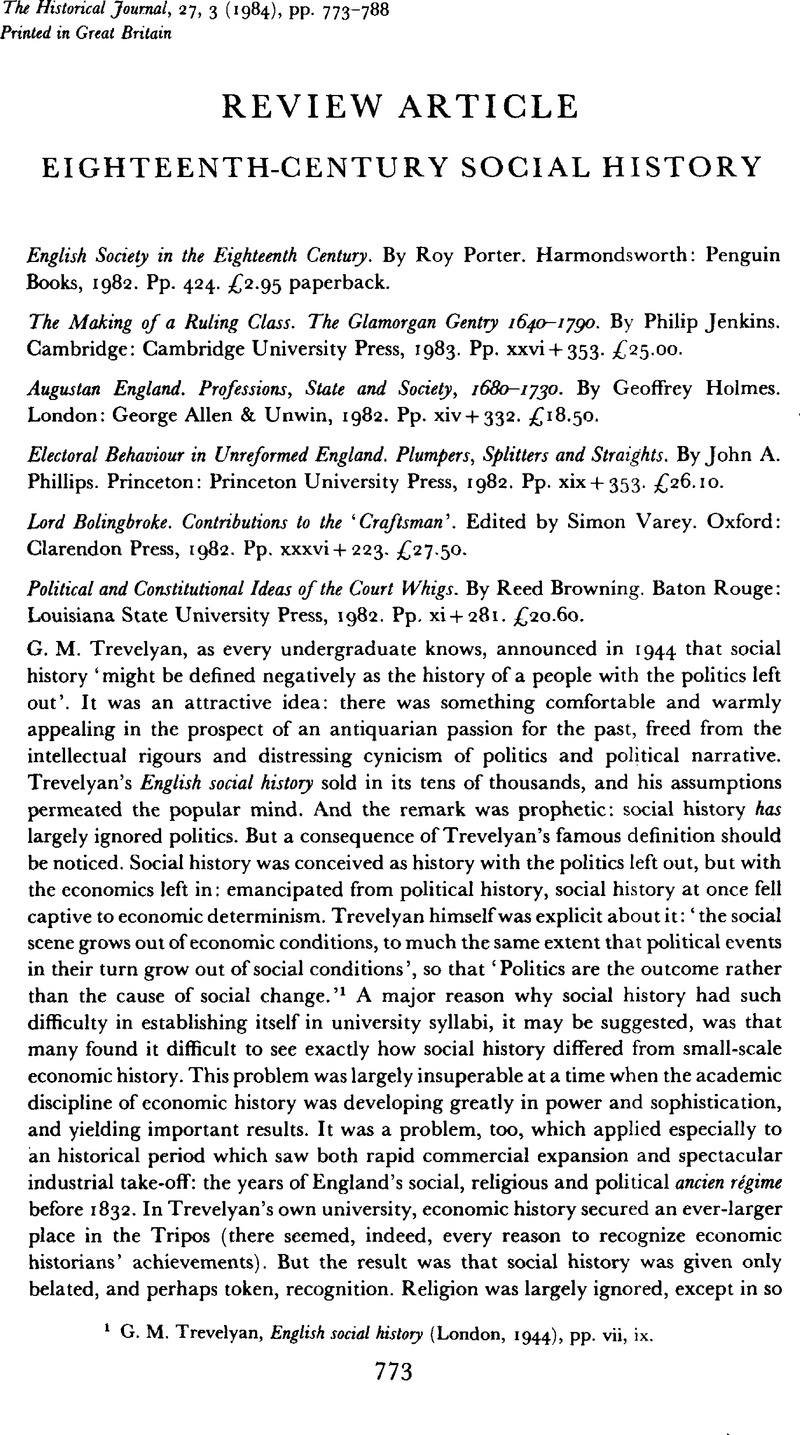Article contents
Eighteenth-Century Social History
Published online by Cambridge University Press: 11 February 2009
Abstract

- Type
- Review Articles
- Information
- Copyright
- Copyright © Cambridge University Press 1984
References
1 Trevelyan, G. M., English social history (London, 1944), pp. vii, ixGoogle Scholar.
2 Few publishers have had such an influence in projecting a certain view of the subject. Since J. H. Plumb became historical adviser to Penguin Books in 1960 their titles on eighteenth-century England have been by J. H. Plumb (three), E. J. Hobsbawm (two), E. P. Thompson (three), Christopher Hill (one), and almost no one else. It cannot be said that Dr Porter is at odds with this common tone.
3 For methodological objections to similar non-quantifiable techniques in E. P. Thompson's work, cf. Currie, R. and Hartwell, R. M., ‘The making of the English working class?’, Economic History Review, 2nd ser., XVIII (1965), 635–7Google Scholar.
4 Dr Porter is fond of blandly repeating that those in authority were above the law: ‘Naval commanders were laws unto themselves on board their own men-of-war’ (p. 135), etc., which they were not. His knowledge of military matters is not exhaustive. Three times we are told that the army officer in command of a regiment is a general.
5 The views of Anglicans, gentry and conservatives appear as ‘dogma’, ‘reaction’, ‘prejudice’, ‘bigotry’ etc.
6 Vincent, John, The formation of the Liberal party 1857–1868 (London, 1966), pp. 79–80Google Scholar.
7 Plumb, J. H., ‘Reason and unreason in the eighteenth century: the English experience’, in Plumb, J. H. and Dearing, V. A. (eds.), Some aspects of eighteenth-century England (Los Angeles, 1971). p. 19Google Scholar.
8 Occasionally Dr Porter has a little difficulty in treating such figures as human beings, e.g. ‘In some ways children became merely superior pets and new objects of consumption for eager capitalists’ (p. 286).
9 Similarly, ‘most rioters’ were not ‘agitprop demonstrators’ but ‘saw themselves as avenging angels of equity and redress’ etc. (pp. 117–18); Blake denounced the ‘smarmy self-congratulators who mouthed pieties and doled out philanthropic halfpennies, while denying life, love, and joy to God's innocents’ (p. 364), etc.
10 Cruickshanks, Eveline, Political untouchables: the Tories and the '45 (London, 1979)Google Scholar.
11 Cf. the arguments of Lenman, Bruce, The Jacobite risings in Britain 1689–1746 (London, 1980)Google Scholar.
12 A post-1760 dating should be preferred to a recent attempt to locate this development in the years immediately after 1714, as an aspect of the single-party ‘whig oligarchy’ proposed by historians denying or minimising a whig-tory divide: Speck, W. A., Stability and strife. England 1714–1760 (London, 1977), chapter 6Google Scholar.
13 It may be suggested that scholars will come to attach far more importance to a tripartite division of modern British history: c. 1500–1660, 1660–1832, 1832–1984. The old categorization of ‘centuries’ –1603–1714, 1714–1815, 1815–1914 – has been infinitely damaging to later-early-modern studies. Professor Holmes's protest (p. ix) against this distortion is very welcome.
14 ‘Many elections in the last decades of the eighteenth century’, he admits, ‘were completely unaffected by political parties, parliamentary debates, or issues in any form’ (p.15); but how many?
15 Split-voting and straight-party voting levels are taken as ‘the two best measures of partisanship’ (p. 214), yet they vary greatly between the four boroughs at each election, and almost as widely within each borough over the eight general elections 1761–1802.
16 Hence Dr Phillips claims the late eighteenth century was a ‘less sophisticated political environment’ than the mid nineteenth (p. 214), a claim which will astonish scholars in the former field.
17 Phillips, J. A., ‘The many faces of reform: the Reform Bill and the electorate’, Parliamentary History, I (1982), 115–35Google Scholar, is a briefer survey of elections in Lewes, Maidstone and Northampton between 1818 and 1841 (it is unfortunate both that it could not have been integrated into his book, and that there is still a gap in his data between 1802 and 1818). It reveals that the real collapse in split voting and the real rise in consistent partisan behaviour came between the general elections of 1830 and 1835, facts which the reviewer would link with the rapid emergence of Conservative and Liberal parties at the time of the Reform Bill. Dr Phillips's article is, therefore, something of a challenge to the arguments of his book. In neither does he justify his obiter dicta about the reality of whig and tory parties, whether before 1802 or during 1815–32.
18 Dr Phillips seeks to resurrect the tory party by enclosing its name within inverted commas. Something more is required for the purpose.
19 Varey, S. R., ‘The Craftsman 1726–1752: an historical and critical account’ (Cambridge Ph.D. thesis, 1976)Google Scholar.
20 They are examined almost without reference to what was being said and thought around them: it is as if Professor Skinner had never written. The range of Professor Browning's sources is very restricted; but the practical problems for an historian attempting this sort of study in the American mid-west must be enormous.
21 How it did so is not revealed: Professor Browning's account of the evolution of parliamentary parties can be distressingly vague (e.g. p. 227), though he rightly denies Brewer's claim that Pitt's accession in 1756 represented the apotheosis of ‘Country Whig’ ideology (p. 53).
22 Dickinson, H. T., Liberty and property: political ideology in eighteenth-century Britain (London, 1977)Google Scholar.
23 ‘The privileges and property of the governing classes’, ‘the privileged position of the propertied élite’, ‘the property-conscious Tories’, ‘men of privilege and property’, ‘those who wished to preserve privilege and protect private property’, ‘how useful this ideology was in preserving the vested interests of such men’, ‘the establishment Whigs hoped to justify a political system in which the few governed the many. Their chief concern was to enable men of property to protect their possessions’: phrases like this run as a leitmotiv through Professor Dickinson's book, and assert (without proving) an economic reductionism of the crudest sort.
- 3
- Cited by




